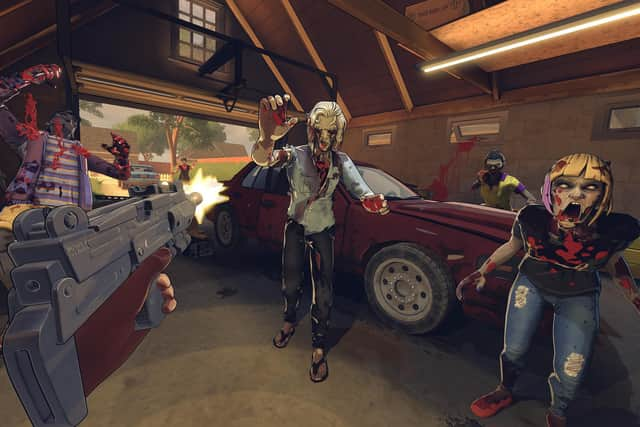The global games industry has been undergoing a ‘readjustment’ post-pandemic - Jamie Sefton
The games industry is still growing but not as fast as during the pandemic, where many more people played games at home and online with friends. This has resulted in global job losses at major companies and studios during 2023 and early 2024 and more caution from game developers, game publishers, platform-holders and VCs.
While game developers in our region are finding the market tougher, it’s a mixed picture and some companies are still doing very well, employing more people and expanding their businesses, with certain games selling in record numbers last year including Hogwarts Legacy, co-developed by Red Kite Games in Leeds.
Advertisement
Hide AdAdvertisement
Hide AdRevolution Software from York has just enjoyed a successful Kickstarter crowdfunding campaign for their Broken Sword: Shadow of the Templars Reforged game and New Star Games/Five Aces Publishing in Ossett have successful titles on their hands with Retro Bowl College (number 1 in the US App Store) and compelling racing game New Star GP.


The games industry is also well aware of these up-and-down cycles, with the last tough period around 2009, resulting in the global economic slowdown coinciding with the transition to digital markets for games including the hugely influential and successful Apple App Store and Valve’s Steam for PC.
The good news to emerge from that period of digital store expansion was that developers could enjoy better financial deals – a 70/30 split and monthly transparent payments, instead of a very small percentage of physical boxed sales that could take months or years to be paid.
Most games publishers had to evolve to allow developers to keep their Intellectual Property (IP) too, so companies in our region like Team17 benefited with their own games such as Worms reaping more of the rewards and the company even becoming a major global publisher of other people’s games itself, releasing the madcap multiplayer cooking game smash hit Overcooked, for example.
Advertisement
Hide AdAdvertisement
Hide AdSo, it’s a complex picture, but generally one section of the games industry that is doing particularly well at the moment, is XR, made up of VR (Virtual Reality) which is fully immersive computer-created worlds using a headset, AR (Augmented Reality) where computer images are overlaid on the real world (such as Pokémon Go), and MR (Mixed Reality) which brings together computer-generated imagery with the real world allowing you to interact with both.
Bobby Thandi, founder and CEO of XR Games in Leeds, creators of Zombieland VR: Headshot Fever and developers of Zombie Army VR, believes that “VR will become one of the major games platforms in the next 5-10 years” and as such, “investors are still keen to invest into high quality gaming and technology companies, especially VR."
We’re seeing major innovations in the hardware space for XR headsets, including most recently, Sony’s PlayStation VR2 that works with the PlayStation 5 console, Meta’s Quest 3 and of course, the new “spatial computer” by Apple, the Vision Pro, described by one of the developers in our region as “the most jaw-dropping piece of tech I’ve ever experienced – incredibly intuitive to use and actually emotional.”
Ben Hinchliffe, lead designer at Just Add Water, also based in Leeds, says: “As a VR development studio we’re not seeing the depressed trend in the games market – we’re seeing an upward trend of people wanting to make VR games and coming to us for development.”
Advertisement
Hide AdAdvertisement
Hide AdHinchliffe has also seen VCs more interested in the sector: “Investors see VR studios as a 10x (ten times) return, they see it as a leftfield pitch that could go really big, so they’re still willing to put money into VR games and studios.”
Much of the games industry headed out to San Francisco, USA, for the yearly Game Developers Conference (GDC) from 18 – 22 March – the most influential B2B event in the games calendar.
Game Republic led a Department for Business and Trade mission to GDC with many of our region’s games companies attending.
We have a good opportunity to hear more about what investors and publishers are interested in, including XR, and indeed if 2024 will start to pick up for all games companies across the sector.
Advertisement
Hide AdAdvertisement
Hide AdWith new midlife hardware refresh for current consoles looking like they’re on the way later this year, the Apple Vision Pro launching in the UK and rumours of a new Nintendo Switch successor in early 2025, games are going to be needed for publishers and platform-holders going forward - and as always, Yorkshire and the North of England will remain at the cutting edge of games development.
Jamie Sefton is managing director of Game Republic.
Comment Guidelines
National World encourages reader discussion on our stories. User feedback, insights and back-and-forth exchanges add a rich layer of context to reporting. Please review our Community Guidelines before commenting.